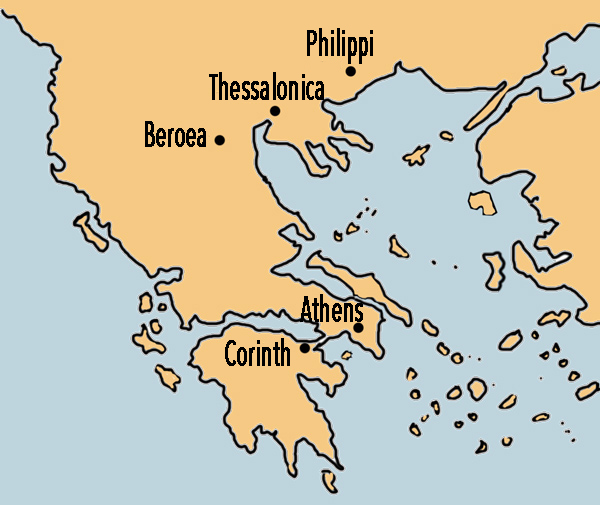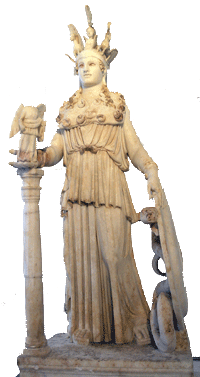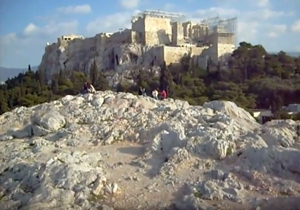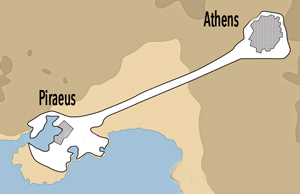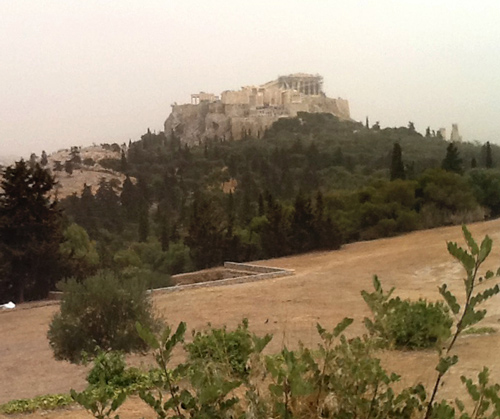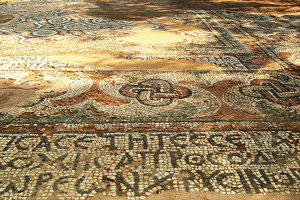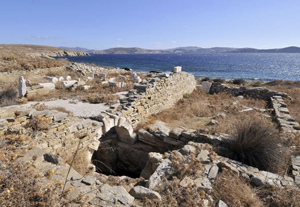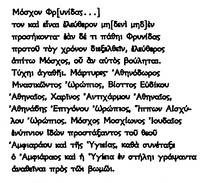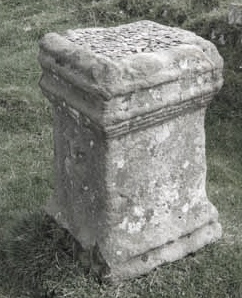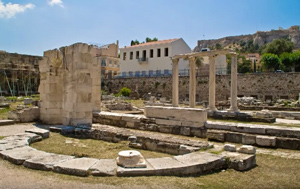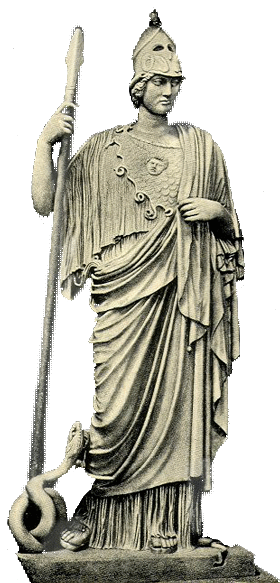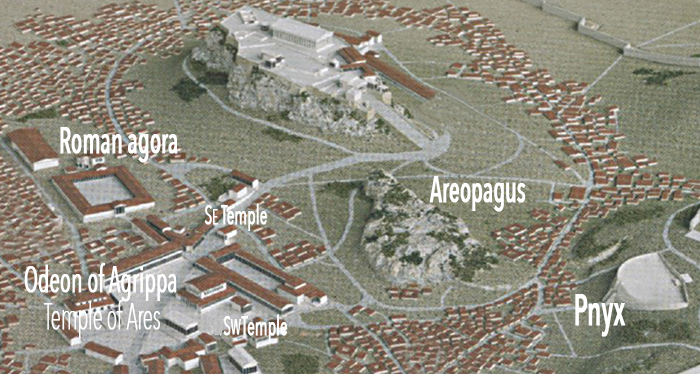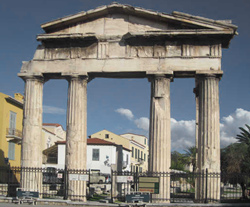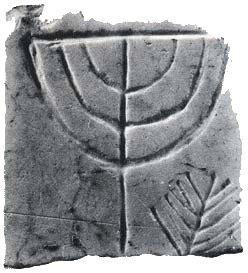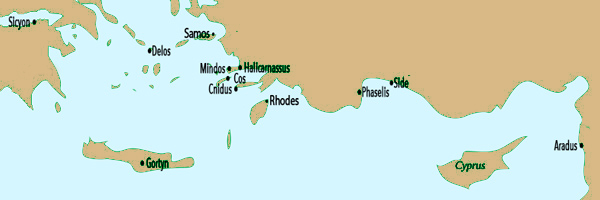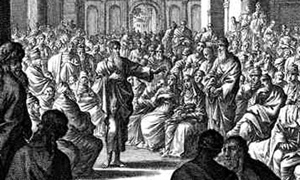
Discuss the world's favourite imaginary friend on the JNE YouTube channel
Was Paul EVER in Greece?
Philippi – First Church in Europe or an origins myth?
Corinth – Rome's imperial command post in Greece. But was it Paul's?
A Greek Odyssey? – Second and Third Missions
Athena – Warrior Goddess of Wisdom
Not for Paul - Not for Jews
Athena Parthenos, the virgin goddess. Her temple, the Parthenon, served as treasury of the Athenian Empire (5th-4th centuries BC).
A temple to Augustus and the imperial cult was erected in front of the Parthenon in the 1st century BC.
In the 6th century AD the Parthenon was vandalised by Christians and converted into a church dedicated to the Virgin Mary ("Mother of God")..
Slippery when wet
Areopagus – looking east towards the Acropolis. The name Areopagus survives today as the title of the Supreme Court of Greece.
Athens-on-Sea
To provide Athens with secure access to the sea, 6 km walls were constructed from the city to its port at Piraeus. Here was housed the massive Athenian fleet which allowed the city to be the naval superpower of antiquity.
The Roman general Sulla destroyed the long walls during his siege of Athens (87–86 BC) and Piraeus was razed to the ground. It remained a backwater for nearly two millennia. When the starving city fell, much of Athens was destroyed.
The Pnyx – arena for the first democratic assembly
The Jews of Greece
"Most ancient synagogue in Europe"
Mosaic floor of a simple rectangular synagogue on the island of Aegina (27 km south of Athens. Unfortunately for the fans of Paul, it is dated to the 4th century AD.
Another "oldest synagogue in Europe", this one on the island of Delos. However, inscriptions found in the 1980s indicated that the building had been used not by Jews but by Samaritans.
"First Jew" in Greece not a Jew
Inscription from Oropos (near Athens) referring to a slave "Moschos, son of Moschion the Jew" dated to 3rd century BC.This particular Jew (with a Greek name) records that he set up the stone commemorating his freedom under the direction of the pagan gods Amphiaraos and Health!
Romaniote Jews, who take their name from the Byzantine "Romaioi", have a tradition that they arrived in Epirus (northwest Greece) after the destruction of the temple in 70 AD – too late for Paul to lecture them in any synagogue!
Epicureans
Essentially atheistic, Epicureans believed that both body and soul ended with death. Epicurus himself reasoned that the individual should avoid pain (including fear of death) and seek rational understanding of the world.
"When we say that pleasure is the goal we do not mean the pleasures of the dissipated and those which consist in the process of enjoyment ... but freedom from pain in the body and from disturbance in the mind.For it is not drinking and continuous parties nor sexual pleasures nor the enjoyment of fish and other delicacies of a wealthy table which produce the pleasant life, but sober reasoning which searches out the causes of every act of choice and refusal and which banishes the opinions which give rise to the greatest mental confusion."
– Epicurus, Letter to Menoecus
Stoics
Stoicism was pantheistic, identifying an all-pervasive rationale or "logos" in all things. The only goal, therefore, was to live in agreement with the logos, a philosophy well adapted to the Roman sense of duty and forbearance. At death the soul, but not the body, was re-absorbed into the cosmos (or "primeval fire"). The logos of the Stoics would never incarnate as a man.
"The Stoics hold that the universe has two principles ... The passive one is matter, the active is reason that inheres in matter, that is God ... God is one and the same with Reason, Fate, and Zeus ; he is also called by many other names."– Diogenes, Lives of the Philosophers, 7.134,135
Paul doesn't give Platonists, Neoplatonists and Peripatetics a mention!
Here
"Then Paul stood in the midst of Mars' hill, and said, Ye men of Athens, I perceive that in all things ye are too superstitious."
– Acts 17.22 (King James Version)
There
“In the first century A.D. the Council met in the Agora, before the Stoa Basileios.”
– F. F. Bruce, The Acts of the Apostles, 335.
An altar without an inscription might in a later age be used as a pedestal for a statue.
NOT Greek,
NOT inscribed to "an Unknown God",
NOT Evidence
A "favourite" of the godly is this 2nd c. BC Roman altar from the Palatine, restored and inscribed in Latin "sacred whether to a god or goddess".
SEI·DEO·SEI·DEIVAE·SAC
G·SEXTIVS·C·F·CALVINVSPR
DE·SENATI·SENTENTIA
RESTITVITClose enough? Not nearly.
Prototype
A "prototype" for the Areopagus sermon, in fact, is to be found earlier in the book of Acts when Paul and Barnabas are supposedly in Lystra (in southwest Anatolia).
Lystra stands out as the first town Paul encountered with an entirely pagan population. Here Paul heals a cripple by shouting, argues in the Lycaonian language, and gets mistaken for a god!. He instantly recovers from a "fatal" stoning and takes to the road the next day none abashed!
But the dialogue rehearses the argument, used later in Athens:
"Don't worship man-made things, God will no longer tolerate you ignoring his commands, a day of universal judgement has been set."
At Lystra
"Men, why are you doing this? We are mortals just like you, and we bring you good news, that you should turn from these worthless things to the living God, who made the heaven and the earth and the sea and all that is in them.
In past generations he allowed all the nations to follow their own ways; yet he has not left himself without a witness in doing good—giving you rains from heaven and fruitful seasons, and filling you with food and your hearts with joy."
– Acts 14.15-17.
At Athens
"God that made the world and all things therein, seeing that he is Lord of heaven and earth, does not live in shrines made by man,
Being then God's offspring, we ought not to think that the Deity is like gold, or silver, or stone, a representation by the art and imagination of man.
And the times of this ignorance God overlooked, but now he commands all men everywhere to repent;
– Acts 17.24-30
Socrates hears God
"God has given me through the oracles' voice, through that of dreams and through all the means no other heavenly power has ever used to communicate its will to a mortal."
– Plato, Apology 33
Paul hears God
"Then spoke the Lord to Paul in the night by a vision, Be not afraid, but speak, and hold not your peace."
– Acts 18.9
"Athens" + "Agora" =
ATHENAGORAS ??!!A supposed Athenian "philosopher who became a Christian" was Athenagoras (late 2nd century?), whose life is completely unknown.
He is unmentioned either by Eusebius or Jerome though 5th century Philip of Side claimed Athenagoras "converted from paganism after reading the gospels."
Which makes it all rather curious that in his defence of the Resurrection, Athenagoras failed to make any reference to the scriptures at all!
Highs and Lows
A remnant of Hadrian's Library – and a later church
"Emperor Hadrian, a benefactor to all his subjects and especially to the city of the Athenians."
– Pausanias, Description of Greece, Attica, 1.3.2
The so-called Library of Hadrian – it was actually rather more of a cultural centre – was one of the most impressive and luxurious buildings ever built by that emperor. Monumental porticoes flanked a large central hall. It was described by Pausanias (I.18.9) as having one hundred columns of Phrygian marble, a gymnasium and a gilded roof.As well as library, the complex appears to have served as forum, records office, administrative centre and as a sanctuary to the imperial and other cults.
Despite this singular failure, the super-apostle's so-called "Areopagus sermon" lives on in Christian tradition as a profound rebuttal of Greek philosophy. How long was Paul in Athens? It's impossible to say. He was not driven out by popular tumult or persecution. Rather, he took himself off to Corinth where the Lord himself reassured him he would have more success ("One night the Lord spoke to Paul in a vision: 'Do not be afraid … I have many people in this city.' " - Acts 18.9-10). Why did the Lord not direct Paul to Corinth in the first place? Did the Lord want the "Areopagus sermon" to appear in the Acts of the Apostles or was that really the intention of the author of the Pauline fable? Could it be that the truth is rather mundane, that the entire Athenian episode is invention, a symbolic story of Christian triumph over pagan error? "Athens" is not the city but the entire Greek philosophical world, rendered obsolete by the superior truths of the cross. Or so they would have you believe.
"Alone in Athens" – so just who is taking notes?
In the alternative chronology of Acts Timothy remains in Berea (Veroia/Veria) and it is unnamed "others" who take Paul to Athens, leaving him there alone but taking back a message that Timothy should join Paul (which he does – though not in Athens but in Corinth. Presumably Paul sent an angel, or a carrier pigeon, to advise Timothy of his new location). Either way, Paul is alone in Athens when he delivers his sermon to the Athenians. So just who is taking notes?
And when was all this? 41 AD? 49 AD? 51 AD? 54 AD? Who Knows! So poorly authenticated is Paul's sojourn in Athens that establishing quite when he was in the city is nothing more than a pious guess. The supposed Claudian "expulsion of Jews from Rome" (flatly denied by Cassius Dio and unsupported by Josephus) is one line in the sand, given the claim that in Corinth Paul is said to have met "Aquila and Priscilla, who had recently come from Italy." (Acts 18.2) Paul's presence in Athens has to precede that meeting. Claudius reigned between 41-54 AD and a "popular" date for the expulsion of the Jews is 49 AD. But Dio's denial of the expulsion ("He did not drive them out, but ordered them, while continuing their traditional mode of life, not to hold meetings." Roman History, 60.6.6), – far more believable – is placed at the beginning of Claudius' reign, 41 AD. Other scholars push the date later, into the 50s. In short, Paul's stay in Athens floats free of any historical foundation – and thus strengthens the the probability that it is fiction. Unnoticed by Paul Whether as early as 41 AD or as late as 54 AD, it is rather curious that Paul betrays no awareness that the Athens he is visiting is a Roman possession undergoing reconstruction by the superpower. "Paul" (or rather, the author of Acts) speaks of an Athens of the classical era. Back in the 5th century BC, when Athens had a population above 100,000, tribute to the city had poured in from a string of captive "allies" which, together with plunder from Persian outposts, had paid for the spectacular temples, monuments and statuary that had beautified the city in the "age of Pericles". But several centuries had passed and the city had far declined since her "golden age" as an imperial power. Defeated by Sparta (404 BC) and then by Macedonia (338 BC), Athens had eventually been besieged by the legions of Rome.
Greece – impoverished by war, looted by Rome
Piraeus, whose naval yards had once made Athens a great sea power, was burnt to the ground and was to remain a backwater until the modern era. The long walls which linked the port to Athens were torn down and after several months and a night attack, the starving city fell. The agora and surrounding district were extensively damaged. Pillage followed the destruction as remaining sculptures were looted and shipped back to Rome. Sulla even seized columns from the incomplete temple of Olympian Zeus for use in the Temple of Jupiter back in Rome. Desolate and largely depopulated, Athens lingered on. Unfortunately for Greece the country continued to be a battlefield in the half-century that followed. Rome's own civil wars – and the battles of Pharsalus, Philippi, Actium – were all fought in Greece. The consequence was that much of the country was reduced to a desert, denuded of its inhabitants. More than a century later, even Nero was moved to grant Greece immunity from Roman taxation. At the close of the civil wars the victor, Augustus, initially punished Athens for the city's support of Anthony by confiscating the Athenian territories of Aegina and the town of Eretria. When in 27 BC Augustus reorganized the peninsula into the province of Achaea a restored "Roman" city of Corinth became the capital. The second city of the province was Patrae, not Athens, the third Nicopolis. But for its ancient glories and reputation as a seat of learning Athens, now deep in debt, might have followed Sparta and Thebes into oblivion.
Athens gets a Roman makeover Romanised Athens Welcomes Philhellenic Romans!
A restoration of Athens began under Augustus with clearance of the area north of the Acropolis and the building of a new agora ("Market of Caesar and Augustus") between 19 and 11 BC. This became the new commercial and trading centre of the city, a porticoed Roman-style forum. An inscription on the western gate of the forum ("Gate of Athena Archegetis") credits both Julius Caesar and Augustus for providing the funds. Close by the eastern gate (and near the Athenian water-clock ("Tower of the Winds") Roman engineers installed public latrines. With essentials provided for in the new market, the area of the original agora was redeveloped into a showplace for Roman tourists. The open space of the agora was progressively filled with buildings. In the northeast corner a colonnaded basilica for use by the Roman administration was erected. This building was later enlarged and given elaborate decoration by Hadrian. Visiting Roman grandees made donations to the city, most notably the trusted lieutenant of emperor Augustus, Marcus Agrippa. He ordered the construction of a massive Odeon of Agrippa ("Agrippeion") (15 BC), a sort of concert hall with seating for over a thousand people. The Odeon dominated the central area of what had been the old agora. On a new platform opposite the Odeon a temple to Ares, originally erected on the site chosen for the new market, was dismantled stone by stone, reassembled, and rededicated to Ares and Augustus. Caligula (37–41 AD) added a monumental staircase to the temple. An Altar of Zeus was relocated from the Pnyx to the old agora (hence, "Altar of Zeus Agoraios"): the Pnyx was a levelled and walled hill to the southwest of the Acropolis designated as a public meeting area, although in the Roman period the "popular assembly" (ecclesia) gathered in the theatre of Dionysus on the slope of the Acropolis where sacred performance gave way to crude Roman amusements. An unfinished temple from Thorikos was also re-erected in the agora to the west of the Odeon (the "SW temple", dedicated, probably, to Demeter and Kore). Here was a theme park suited to Roman tastes. It was a city living on the glories of its past, restored as a tourist attraction for the new Roman masters. The philosophical schools (Peripatos, Academy, Stoa, Garden) still continued but were now secondary choices to the schools of Alexandria, Antioch and Rome. One can imagine jugglers, dance troupes and Athenians on the make feigning the role of "philosophers" to earn the pleasure of their Roman visitors. The "free city" of Athens had been redeveloped, Roman-style, long before any "Paul" ever reached the shores of Greece. In prime space in front of the Parthenon, a circular temple of Roma and Augustus had been erected, a shrine to the imperial cult that was now honoured throughout the city. From the rock called Areopagus a speaker could have looked up and seen the new temple. Yet Paul says nothing of the sacrilege. So did any Paul ever visit Athens?
When Worlds Collide A Jewish-Christian view of Athens
But was Paul the boorish prig he appears to be or is this entire episode a literary construct? In the lands of the eastern Mediterranean the real challenge to Jewish/Christian mysticism was Greek rationalism and Athens was its historic centre. For many centuries the city had been the respected centre of learning for the ancient world. But "Paul", salesman of divine revelation, has no interest in "mere human wisdom" – the apostle pours scorn on secular reason and empirical study at every opportunity.
No Jews and No Synagogue and in Athens in 1st century AD
If, as Paul says, the city was "wholly given to idolatry" surely that did not include idolatrous Jews? And if there were no Jews was there a synagogue? In 1977 a marble fragment – about the size of a hand – and apparently incised with a seven-branched Menorah and a palm branch indicated a "possible" synagogue in the agora. But it was dated no earlier than the late 4th century AD. Nothing has ever been found to suggest a 1st century synagogue for any St Paul to have visited. In fact, placement of a cult shrine in the agora was indicative of its importance to the Athenians and the alien Jewish god Yahweh would never have qualified. The 2nd century Greek geographer Pausanias (Description of Greece) writes at length of the sites of Athens, and is especially interested in the sacred. Yet Pausanias says nothing of any synagogue. Nor does he comment on the presence of any Jews in the city.
Today, there are about 8,000 Jews in Greece, a country with a population of around eleven million. The American Jewish ADL has described Greece as the most anti-Semitic country in Europe. Greek antipathy towards Jews stretches back to antiquity and the reasons are not difficult to fathom. The creative genius of the ancient Greeks found little of interest in these peculiar and barbarous orientals, in thrall to a violent and egotistical deity. The two races met initially in war. After two centuries as a vassal state of Persia, when Alexander marched east Judah capitulated without a fight and found itself a minor possession of the Macedonian conqueror. The Greeks recruited Jewish mercenaries into their army, planted their cities across the Levant, and moved on. On the other hand Greek influence on the Jews was profound, creating "Hellenists" among them. Some Jews, certainly, dispersed into the Hellenistic world, adopting Greek names and customs, and giving birth to a new literature. Hellenism altered and invigorated the culture of the Jews, producing, ultimately, a new syncretic religion. Sparse evidence suggests that the Hellenist Jews followed the trade routes and were to be found in many port cities of the eastern Mediterranean. But Athens was NOT one of them.
Jewish escape route?
Paul teaches wisdom to the philosophers of Athens? Fat chance.
We are told that it was "certain Epicurean and Stoic philosophers" that took Paul to the Areopagus and yet Paul begins by reproaching his audience as "very religious", or as alternative translations would have it, "too superstitious" (δεισιδαιμονεστέρους). What an extraordinary charge to put before Epicureans, sober rationalists and to all intents, atheists. For them, the gods – if they existed at all – did not create the universe and lived unconcerned about the lives of men. Nor were the Stoics starry-eyed mystics, besotted with the irrational. For them, "god" was a rationalism or "logos" that permeated all things. And Paul, the man who claimed to hear the voice of god guiding and directing him, had the audacity to tell the philosophers they had too much religion? It is beyond all credibility that Epicurean and Stoic intellectuals would have given the time of day to a Jewish guru who made only irrational assertions. The Greek philosophers have simply been used by the author of Acts to set up a pseudo-trial. The real target of the so-called "speech" are the "Men of Athens" – that is, the mass of non-elite polytheists. As the frontman of Christianity, the "Paul" of Acts is making a direct appeal to Greek pagans who, in time, will be force-fed Christian dogma. Christianity was not interested in a debate with Greek rationalism – it was fanatically determined to destroy it. For "Paul" and the author of Acts philosophy was a dangerous deceit.
All very theatrical. And all very bogus,
"In the midst" ? In the fantasy world of the Christian imagination Paul "out philosophises" the Athenian philosophers with barely 200 words. The enthusiasts for Jesus, however, can't agree whether the multitude gathered in a basilica or on the top of a sacred rock!
Areopagus – The Hill of Mars The rocky outcrop at the foot of the Acropolis, the Areopagus.
Christians have always exaggerated the importance of both the rock and the antique court named after it. By so doing they give support to the claims made in Acts regarding Paul's supposed sermon.
Unknown "Unknown God"! No altar with the inscription "to an unknown god" has ever been found in Athens!
The content is disjointed nonsense assembled around a blatant falsehood: that the Athenians confessed themselves to be "ignorant of god" and Paul, of course, was there to put them straight.
How does the author of Acts derive this startling confession? With a sleight of hand in which a literary reference to "gods unknown" becomes an "inscription to an Unknown God"! "Paul" apparently found an altar inscribed "To an unknown god" – a remarkable discovery considering that no one else ever has. Of tens of thousands of Greek inscriptions not one has ever been found thus inscribed. And why would it be? The Greeks knew their gods. But altars might be uninscribed and with the trend within Neoplatonism to resolve the multiple gods of polytheism into a single all-embracing deity, altars lacking any inscription had become a commonplace. That observation is found in literature from the period – literature available to the author of Acts. In particular, the author of Acts would have been aware of a folktale in which plague in 6th century BC Athens had been eliminated by Epimenides, a hero of Crete. Apparently, Epimenides ordered sacrifices on altars without inscriptions. The yarn was later presented as history by Diogenes:
That this folktale is the origin of "altars of unknown gods" is made more certain by Acts 17 actually quoting from a poem of Epimenides (a poem also quoted in the epistle to Titus). Paul – who claimed to have excelled all his peers in knowledge of the Hebrew texts, who spoke the native Lycaonian language in the uplands of Anatolia, was evidently now comfortably at home with Greek literature and able to quote freely from the Greek poets. As if. The Areopagus sermon
Athenian philosophers would not have warmed to Paul's misrepresentation of "gods unknown." So why would "Paul's audience" have listened to this nonsense? The writer of Acts holds the drama together by depicted the philosophers as infatuated by novelty and it seems to them that Paul has "a new god" – or as later Christians would argue, "two new gods", Jesus and the Resurrection! From as early as 5th century and patriarch John Chrysostom, Christian apologists have suggested that the not-so-smart philosophers of Athens thought that Paul was speaking about two gods, Jesus "the male deity" and "Anastasis" (Resurrection) "the female deity". Silly billies.
Paul goes on to make several unconnected points: God made everything; God does not need anything; God is close; universal brotherhood ("from one ancestor"). Having made these trite assertions "Paul" issues a threat: God had hitherto "overlooked" human ignorance but now "he has appointed a day on which he will judge the world." With that, the mighty apostle from Tarsus makes his exit! Note that there is no reference in the speech to an earthly ministry of Jesus the godman, only that God had ordained as his judge "a man that he had raised him from the dead". But Paul does not even name this man. The readers of Acts rely on earlier references to Jesus Christ to know who this judge-elect is but "Paul's audience" in Athens – if it had ever existed – would have been in the dark unless they had been party to Paul's earlier disputations in the market place. Recognizing this illogicality, the author of Acts has "some" of his listeners unwittingly state the Pauline mission: "because he preached Jesus and the resurrection." (Acts 17.18) There is no explanation as to how Jesus had lived on earth or died on the cross, no mention of how this man – whoever he was – "fulfilled prophecy". Paul doesn't even claim that the man was the "Son of God". The writer of Acts is not working from the gospels here but from a wholly different source.
Source of the story The Trial of Socrates There are many curious parallels between the "trial of Paul before the Areopagus court" and the trial of Socrates four-hundred years earlier. We have two extant sources for the latter: the Apology of Plato and the Memorabilia of Xenophon. These accounts were among numerous reports of the trial available to the author of Acts and there can be no doubt that he derived inspiration for the "trial of Paul" from the famous story of Socrates. • The "charge" levelled at Paul was identical to that levelled at Socrates – introducing foreign gods (Plato, Apologia, 24). • Socrates, like Paul, expounded his views in the market place before "going to trial". • Socrates, like Paul, heard the voice of God. • Socrates, like Paul, feared "unrighteousness" more than death. • Socrates, like Paul, quoted poets. • Socrates, like Paul, believed judgement would be from "righteous sons of God." • Socrates, like Paul, was no democrat or egalitarian. He believed that the common people were like sheep, in need of firm direction by a wise shepherd.
Failure in Athens, Triumph in Greece
Writing centuries later, church historian Eusebius would have us believe that another Dionysius (this one the pastor of Corinth) vouched that his earlier namesake had indeed been "the first bishop at Athens" – pretty impressive considering that the Areopagite had no congregation, no church, and this was a century before bishops appeared! Despite the claim made in Acts, another "tradition", however, gives this honour to "Hierotheos the Thesmothete" (a junior ruler or Archon). Adding to the melee, a 5th century Neoplatonist, himself called Pseudo-Dionysius described Hierotheos (or perhaps, a Pseudo-Hierotheos!) as a divinely inspired hymnographer ! Just as odd (and perhaps indicative of a later redaction) is the naming of a second convert, a woman named Damaris, "and others", with no further details and no known history. Damaris is a Greek adaptation of the Jewish name Thamar or Tamar (the biblical whore who produced an ancestor of Jesus by her father-in-law). 4th century bishop Chrysostom made the claim that Damaris had been the wife of Dionysius, an obvious fancy. In truth, the converts are invention and the reference to an "Areopagite" is only made to give a triumphant ending to a "mission" that never occurred and had no legacy. As the modern author Marios Verettas remarks: "Members of the Areopagus would never be called by their title of 'judges of impure crimes', but would prefer to be called by their highest honorary distinction, which was that of an Archon." The Athenians were unmoved by any mystic from the Levant. It is perhaps significant that having given a "solid response" to Athenian rationalism, the hero of Acts goes off to Corinth determined to "know nothing but Jesus Christ, and Him crucified".
The Church Militant First church in Athens
The marriage was in June 421. Keen to prove her fidelity to Christ, Eudocia authorised the construction of the first church in Athens. In a tragic irony, it was raised within the ruined edifice of the Library of Hadrian, a once magnificent cultural centre, equal in size to the adjacent Roman agora. By then, what remained of Hadrian's main library building had been re-purposed as part of the "late Roman" wall that protected the tiny inner city and served as a garrison for the local militia. Eudocia's church took the shape of a Greek cross (tetraconch) and was built over what had once been the central ornamental pool. The ancient Panathenaic Way, which had run diagonally across the ancient agora and up to the Acropolis, now disappeared in favour of a new road which ran directly to the church. The symbolism was palpable. The politically-savvy girl was making clear to her fellow Athenians that Christianity was in command and the old gods were dead. Thereafter, for centuries, the only substantial buildings to be built in Athens would be churches. The hungry, if unwashed, inhabitants sank silos for storing cereal into the floor of the Roman bathhouses. All the temples of antiquity, including the Parthenon itself, the Erechtheum, the Temple of Hephaistos, were reconsecrated to the Christian godman. The light of reason had died in the city of wisdom. The final blow was delivered by the Christian emperor Justinian who closed forever the schools in 529/532. The last scholar, a Neoplatonist named Damascius (458-538), fled to Persia. In 515. He had written a biography of Hypatia, the last head of the Library of Alexandria, murdered by Christian fanatics. The curious Pseudo-Dionysian writings may be his work – "the last counter-offensive of paganism" – Neoplatonism smuggled into Christian theology when all else had been lost. Not one to miss a trick, Justinian had columns from the ancient agora transported to Constantinople for use in his construction of St Sophia. The decline of Athens was assured.
Twilight
Paul, the fictitious prophet of the new revelation, is now presented as a "philosopher" – in fact, a great philosopher. He first preaches in a nonexistent synagogue to indicate to the reader that the "mission to the Gentiles" is still proceeding. The Athenian philosophers are then decried as "novelty-obsessed" (for, in the eyes of men of faith, that is all that rational empiricism amounts to, an affectation of leisured elites). These intellectuals regard Paul as a "babbler", a purveyor of second-hand scraps. But they are too clever by far. God's sublime truth is revealed to those of child-like minds, undisturbed by the wisdom of men. Taken before a court which symbolizes the revered and most ancient traditions of Athenian culture, the apostle sets at nothing the wisdom of men and the accomplishment of centuries. With the stern warning that his god now demands repentance and that a judgement day has been set for all men, the uncompromising apostle exits the stage. Theatre – but not history.
Sources:
|
||||||||||||||||||||||||||||||||||||||||||||||||||||||||||||||||||||||||||||
